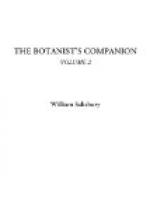Similar Plants.—Sonchus arvensis; Lactuca Scariola.
223. Lavandula Spica. Lavender. Flowers. L. D.—Lavender has been an officinal plant for a considerable time, though we have no certain accounts of it given by the ancients. Its medical virtue resides in the essential oil, which is supposed to be a gentle corroborant and stimulant of the aromatic kind; and is recommended in nervous debilities, and various affections proceeding from a want of energy in the animal functions.—Woodville’s Med. Bot. p. 323.
224. Laurus nobilis. Bay-tree. Leaves and Berries. L.—In distillation with water, the leaves of bay yield a small quantity of very fragrant essential oil; with rectified spirit, they afford a moderately warm pungent extract. The berries yield a larger quantity of essential oil: they discover likewise a degree of unctuosity in the mouth; give out to the press an almost insipid fluid oil; and on being boiled in water, a thicker butyraceous one of a yellowish-green colour, impregnated with the flavour of the berry. An infusion of the leaves is sometimes drunk as tea; and the essential oil of the berries may be given from one to five or six drops on sugar, or dissolved by means of mucilages, or in spirit of wine.—Woodville’s Med Bot. p. 680, 681.
225. Laurus Sassafras. Sassafras-tree. Bark. L. E. D.—Its medical character was formerly held in great estimation; and its sensible qualities, which are stronger than any of the woods, may have probably contributed to establish the opinion so generally entertained of its utility in many inveterate diseases: for, soon after its introduction into Europe, it was sold at a very high price, and its virtues were extolled in publications professedly written on the subject. It is now, however, thought to be of very little importance, and seldom employed but in conjunction with other medicines of a more powerful nature.
Dr. Cullen found that a watery infusion of it taken warm and pretty largely, was very effectual in promoting sweat; but he adds, “to what particular purpose this sweating was applicable, I have not been able to determine.” In some constitutions sassafras, by its extreme fragrance, is said to produce headache: to deprive it of this effect, the decoction ought to be employed.—Woodville’s Mat. Med. p. 677.




